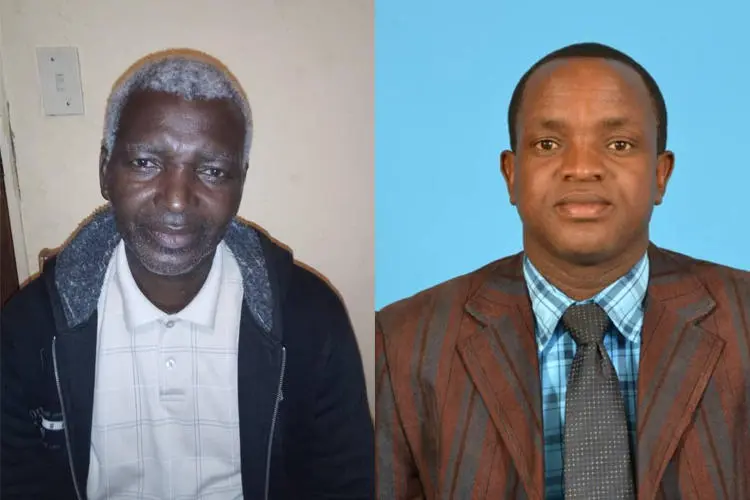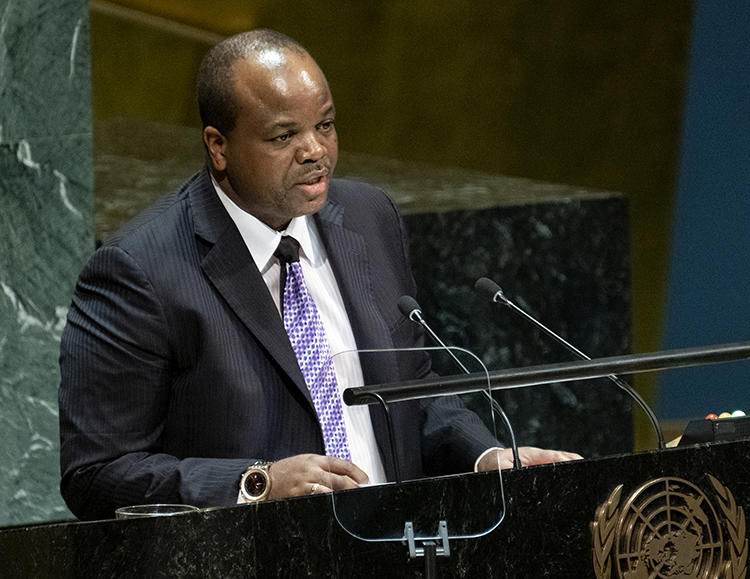New York, April 30, 2020 — Swaziland police should stop intimidating and harassing local journalists for reporting critically about King Mswati III and should allow them to write freely without the threat of treason charges, the Committee to Protect Journalists said today.
On April 23, police officers raided the home of Eugene Dube, the editor and publisher of the privately owned news website Swati Newsweek, and seized his three mobile phones, a laptop, and work documents, according to local news reports and the journalist, who spoke to CPJ by phone and messaging app.
Officers took Dube to a local police station in Nhlangano, the capital of Swaziland’s southern district, where they interrogated him for about seven hours about two recent articles in Swati Newsweek critical of Mswati III, and then brought him before a magistrate to record a statement, he said.
Dube told CPJ he was released without charge, but said the officers did not return his devices or documents.
On April 24, a police officer in Matsapha went to the home of Mfomfo Nkhambule, a Swati Newsweek reporter who wrote one of the articles that Dube was questioned about, brought him to a local police station, and interrogated him for two hours about the articles, Nkhambule told CPJ via messaging app and a phone call.
Dube told CPJ that police were unable to find Mthobisi Ntjangase, the reporter who had written the other article about the king.
“Swazi police should stop threatening journalists like Eugene Dube and Mfomfo Nkhambule for writing critically about King Mswati III, and should instead champion their right to report freely,” said Angela Quintal, CPJ’s Africa program coordinator. “The era of ‘the king can do no wrong’ has long been relegated to the annals of history, and the police should rather focus their resources on fighting real criminals, not the press.”
The journalists said they were questioned about an April 8 opinion piece by Nkhambule, entitled “King Reckless on Swazis’ Health,” which accused the government of failing to adequately respond to the COVID-19 pandemic, and an April 14 article by Ntjangase, based on an interview with the leader of the Economic Freedom Fighters of Swaziland, a radical political group, who said that “removing the king is possible.”
During his interrogation, police questioned Dube about why he gave a platform to the Economic Freedom Fighters, and insisted that the monarch was immune from criticism, saying he could face charges of high treason, Dube said.
At the police’s request, Dube wrote a statement explaining the stories, and wrote that he was trying to alert the Swazi people and the government to lapses in the official COVID-19 strategy, he said.
After his release, police warned Dube that their investigation was still ongoing and said they would return if he continued to criticize the king, said Dube, adding that they kept his devices for further investigation.

Nkhambule told CPJ that the police questioning was “exhausting,” and said that the officers “wanted me to understand that I had erred in writing about the king.”
The officers threatened him with jail time and treason charges for his writing, and said they would return once their investigations concluded.
Nkhambule said that officers previously interrogated him at police headquarters in Manzini on March 12 and questioned him for four hours over articles he had written about the monarch last year for another online publication, Swaziland News. He said officers seized his laptop and two mobile phones during that arrest and had yet to return them.
During that questioning, an officer threatened to throw Nkhambule out of a second floor window and said that police would claim he had tried to escape, he said.
Dube said he and Nkhambule are hoping to raise funds for their legal support and to ensure that their laptops and telephones are returned and police stop harassing them.
Police commissioner William Tsintsibala Dlamini on April 24 threatened that authorities would come down hard on journalists who wrote negatively about Mswati III and said the law would take its course, the privately-owned weekly publication Independent News reported.
In a statement sent to CPJ, government spokesperson Sabelo Dlamini alleged that Dube operated an unregistered media outlet and denied that the journalists were being persecuted for criticizing the king.
The statement said that anyone who reported “fake news” about COVID-19 would face prosecution.
Under regulations passed last month, anyone found spreading false news about the virus is liable to face up to five years in jail or a fine of 20,000 emalangeni ($1,082),
His statement said that those regulations were in line with others in the region.
“In the midst of the global COVID-19 pandemic it is more important than ever that people rely on truthful, transparent information from their government, media and anyone with access to communication tools,” he wrote. “We find that journalists with integrity and ethical practises have no trouble abiding by these regulations.”
